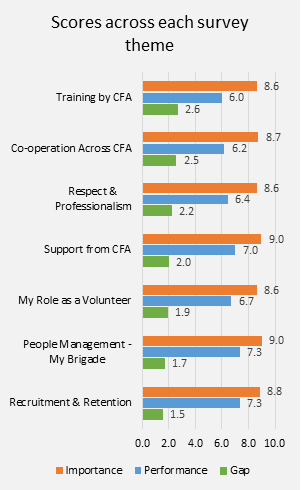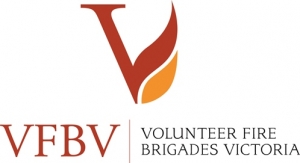2014 VFBV Volunteer Survey - CEO's Foreword
 The 2014 VFBV Volunteer Welfare and Efficiency Survey is the third annual survey of Victoria’s CFA volunteers conducted by Volunteer Fire Brigades Victoria.
The 2014 VFBV Volunteer Welfare and Efficiency Survey is the third annual survey of Victoria’s CFA volunteers conducted by Volunteer Fire Brigades Victoria.
Whilst there are areas for improvement, it is pleasing to see a trend of gradual improvement against many of the survey aspects. The survey’s intent and main benefit is in guiding effort and focusing energy on just such improvements.
The survey is a practical starting point for conversation and continuous improvement, and with the cooperation of all involved it continues to fulfil the hopes we had for it when we launched it three years ago.
The survey is run by VFBV, informed by growing numbers of volunteers and being put to work as a productive tool by both VFBV and CFA. This year’s survey results once again confirm some strong trends that are clear pointers to paths for improvement by CFA.
A practical and productive document, this survey would not have been possible without the support of CFA volunteers, and our special thanks go out to the more than 1,600 members who participated in 2014.
To all of the volunteers who read this report, I urge you to take part in the 2015 survey and to encourage other members of your Brigade and Group to do the same. By registering now, you can receive the survey by email or by post when it begins in July, and by doing so, you add your own voice to those of the more than 1,600 CFA volunteers who had their say last year.
Andrew Ford
Chief Executive Officer
Volunteer Fire Brigades Victoria
2014 VFBV Volunteer Survey - Executive Summary
Observations from the survey results that may warrant further investigation and possible actions include the following:

- Training needs and expectations.
The 2014 survey results identify training by CFA as the biggest issue, with the survey gap at 3.0. This remains the most important issue for CFA volunteers and the issue least meeting volunteer expectations.
- Variation between brigades.
Brigades with an integrated volunteer/career mix of personnel are more concerned with performance in relation to people management within their brigade, cooperation and respect and professionalism. Survey comments point to ongoing issues at integrated brigades that require further attention.
The integrated volunteer/career survey responses consistently scored lower on importance and more so on performance. Integrated brigades scored poorly on performance in relation to workplace bullying, conflict resolution, volunteer consultation, morale and supporting new volunteers. These particular statistical results point to ongoing issues within integrated brigades that require specific attention.
- Equity, diversity and workplace behaviour.
Survey results show that equity and diversity across gender, race and religion are important issues to volunteers. Generally, female survey respondents rated CFA respect, professionalism, volunteer support and brigade support more highly than males across both importance and performance. The differences occur when the questions relate to CFA’s performance in conflict resolution, bullying and harassment, in which case, females rate the management of such issues lower than males.
When tested against gender – female respondents rated both importance and performance lower than male respondents in relation to the statement “there are no barriers to the roles women can occupy in my brigade”. The gap between importance and performance for female respondents was higher than male, signalling that male respondents are more optimistic about how gender, equity and diversity issues are being managed and may not realise areas of deficient approach.
Whilst CFA performance in this area is scored comparatively well against other areas, it remains an area that shows that a gender perception gap still exists in brigades and will require ongoing support.
- The importance of consultation with brigades.
The value volunteers place on consultation both within their own brigade and with CFA is expressed in the survey results where statements referring to consultation within brigades receive good performance scores. Conversely, statements regarding effective consultation at CFA District, Region or Corporate level, receive the lowest performance scores and high gaps.
Written comments from survey respondents refer to issues where inadequate consultation may be the root cause, further suggesting that more work is required to improve consultation between CFA and volunteers.
- The influence of volunteer length of service.
Volunteer length of service has created a distinct pattern across the question responses. Volunteers who have served with CFA for less than one year are the most positive about the organisation and their brigade on nearly every question. The gap sharply increases after their first year of service, i.e. their level of satisfaction drops sharply after one year and then again after more than five years’ service.
- Satisfaction.
80% of 2014 survey respondents are satisfied with their role as a CFA volunteer and 87% intend to continue their membership. The overwhelming reasons for being a CFA volunteer are “to help protect the community I live in” or “a sense of fulfilment in supporting my community in a meaningful way” (total 94%).
Only 59% of volunteers are satisfied with the way they are treated by CFA, this comparatively low satisfaction score suggests that the greatest potential impact on future volunteer welfare and efficiency sits with CFA in the success or otherwise of their partnerships with volunteer brigades.
- Overall.
Overall results across the survey themes (see the graph to the right) show the greatest gaps to be in the training and cooperation themes, and the smallest gap in the recruitment and retention theme. Specific responses within each theme are explained in greater detail in the body of this report.
The analysis of the survey results shows that there are still differences of opinion between genders as to how women are treated in CFA, between volunteer and integrated brigades on how CFA staff treat volunteers, and difference of opinion on how well CFA is performing depending upon how long the volunteer has known CFA.
These differences point to an ongoing need for CFA to improve its culture. The attitudes and norms across CFA need to become more inclusive and more respectful – in terms of volunteer value to the organisation.
IMPORTANT UPDATE FOR MEMBERS
By Andrew Ford, Chief Executive Officer
On behalf of the VFBV Board I would like to provide the first of a number of important communiques to follow up on the action taken by VFBV in the lead up to the recent Victorian election and concerns about the Labor Party policy announcements impacting on CFA.
Please rest assured that the VFBV Board did not contemplate nor take the recent actions without a great deal of reflection, agonising and analysis. The reality is that it was vitally important for VFBV to raise the concerns, motivated then and now by a firm belief and deep fear that the policy suite announced by Labor includes elements that could have disastrous consequences for CFA and therefore Victoria’s volunteer firefighting capacity.
Firstly may I take this opportunity on behalf of the VFBV Board to thank VFBV Delegates and volunteers across the State for your support and involvement in helping to communicate the VFBV Board’s concerns. The VFBV campaign was delivered very well given the short time frame, the message was put across well and received by those who needed to hear it most.
Sensitive issues such as this can often cause tension and/or be distorted by people with different views or agendas and I am very proud of the way VFBV Delegates and volunteers engaged in calm, constructive messaging; respected the rights of others to have a different viewpoint; and avoided twisting our concerns or targeting individuals.
Members need to be aware that the policy announcement triggering our concerns about surrendering the decision making powers of the CFA Chief Officer to external industrial interference and union-driven process was only made by Labor on 18 November. This meant that our timeframe for activating and explaining our concerns was very tight.
Whilst our campaign activation required short lead times, the concerns expressed by VFBV are not new. Only a few years ago VFBV collected 23,000 signatures petitioning the Legislative Assembly of Victoria to address volunteer concerns about similar industrial interference with CFA.
The recent Jones Inquiry and countless discussions and representations to Government over the past nine years or so provided a deep background to the concern expressed in the VFBV Board open letter.
The overwhelming response from both the general public and our membership has been extremely encouraging, and will provide a good platform for us to continue to pursue our concerns with the new Government, and a base of understanding to work towards fixing the concerns we have raised.
VFBV remains deeply concerned and our energy will now be put to working with our new Minister and MPs across all political parties to find solutions. I have already spoken to several MPs and Government staff about quickly starting a conversation to improve the understanding of the concerns VFBV has raised, and to find a way forward that not only avoids damage to Victoria’s vital volunteer capability, but sustains and strengthens it.
In the lead up to the election, the CFA Chief Officer and others were not able to comment nor discuss the implications of Labor’s CFA-related policy elements, however we do know that in recent years they have been equally troubled by the very same concerns raised by VFBV. VFBV spoke up because no one else could.
CFA have been seeking, over the last few years, to remove this industrial interference and overriding of the Chief Officer’s powers and to ensure the Chief Officer is in charge of determining CFA operational resource needs, volunteer brigade support needs etc. We are aware that CFA did not request the additional paid staff that Labor announced and we know the CFA Board and management are strongly committed to delivering the direction set down in the CFA Act, maintaining CFA as a volunteer based and fully integrated organisation.
VFBV will now focus on working with CFA and Emergency Management Victoria to ensure volunteers are positively and fully engaged in working within the new Government’s policy context to avoid damage to CFA volunteer capability and to educate MPs, key Government decision makers and the community about what is required for the long term success of CFA.
Now that the new Government has been sworn in, I will be seeking an opportunity to meet with our new Minister, The Honourable Jane Garrett, in the next few weeks. I will continue to pursue and explain the concerns raised by the VFBV Board and will be offering our support to finding a solution to our concerns.
It is important to remember that the VFBV campaign in the days leading up to the election was a campaign about a policy with which we have deep concern. In the same way that our strong campaign for presumptive legislation was highly critical of inaction by the previous Coalition Government but was not anti-Coalition, our recent assertive public campaign and our continued approach on this issue needs to remain focused on the concerns we have about this policy and the way it has been constructed, not party political.
I have said many times that these concerns are not about being anti-paid staff, and are not about being anti-union. CFA members, paid and volunteer alike, working together as one integrated team is vital for effective fire and emergency services to Victoria. Nothing in VFBV’s recent campaign was about detracting from the value of CFA paid firefighters and nothing was about criticising the union pursing the best possible pay and conditions for their members.
I urge all members to stay focussed on the real issues of concern and that is that VFBV believes there should not be external industrial interference with the CFA Chief Officer’s power to decide where and when and how he uses CFA firefighters. VFBV is very concerned about any policy or motivation that wittingly or unwittingly erodes Victoria’s volunteer firefighting capacity, and VFBV is strongly opposed to industrial agreements that override CFA decision making and unfairly impact on the rights and support of volunteers.
On a brighter note, other policy announcements made by Labor included additional CFA fleet funding, the introduction of presumptive cancer legislation for both career and volunteer firefighters, and additional funding for the fire station amenities program.
Some of the detail on these issues is still patchy and I will provide more as soon as I have it. With regard to fleet funding, I will be writing to the Minister to clarify whether the additional $18M is an annual base funding adjustment consistent with our advice about CFA’s annual base funding shortfall for fleet replacement, or whether it is a one-off, in which case our old problem has not been resolved.
I will also be following up to confirm that the intention is not to treat volunteers differently from career firefighters with regard to presumptive cancer legislation, as has been done in the Tasmanian legislation referred to in Labor’s announcements.
I can assure you VFBV will work hard to find the best way forward and in the meantime we will also stay focussed on the many other challenges and opportunities ahead for CFA.
Please pass on this thanks and update to your networks and stay tuned for some further advice in the coming weeks.
The upcoming bushfire season is traditionally a period of high visibility and a showcase of CFA professionalism and dedication. As in years past, VFBV will continue to represent your interests, so you can continue to do the vital work of protecting our communities in their time of need.
 Displaying items by tag: Executive
Displaying items by tag: Executive
